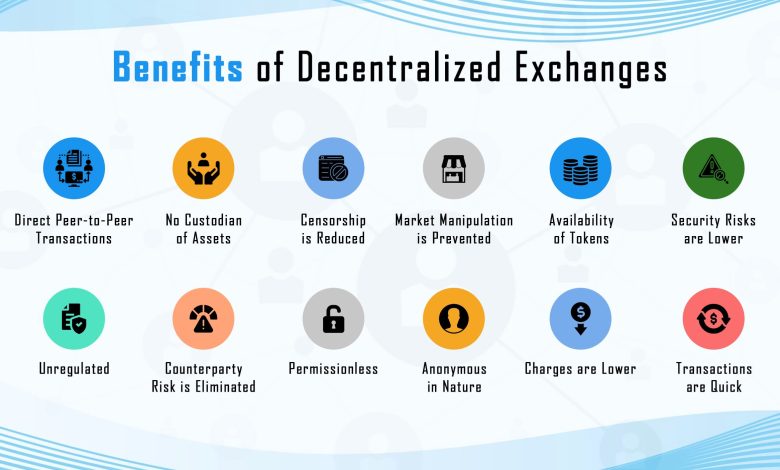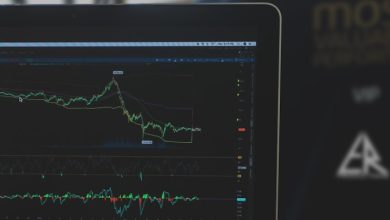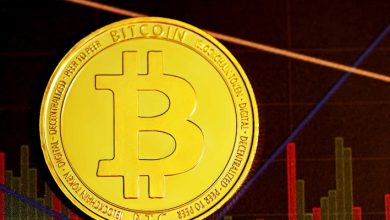The Role of Decentralized Exchanges in the Market

- Understanding Decentralized Exchanges
- Advantages of Decentralized Exchanges
- Challenges Faced by Decentralized Exchanges
- Regulatory Environment for Decentralized Exchanges
- The Future of Decentralized Exchanges
- Comparison between Centralized and Decentralized Exchanges
Understanding Decentralized Exchanges
Decentralized exchanges (DEX) are platforms that allow users to trade cryptocurrencies directly with one another without the need for a central authority to facilitate the transactions. This peer-to-peer model offers several advantages over traditional centralized exchanges, including increased security, privacy, and control over funds.
One of the key benefits of decentralized exchanges is that they eliminate the need for users to trust a third party with their funds. Instead, trades are executed using smart contracts, which are self-executing agreements stored on a blockchain. This means that users retain control of their private keys and assets throughout the trading process, reducing the risk of hacks or theft.
Another advantage of decentralized exchanges is the privacy they offer. Because trades are conducted directly between users, there is no need to create an account or provide personal information to a central authority. This anonymity can be appealing to those who value their privacy and want to keep their trading activities confidential.
Additionally, decentralized exchanges are often more resistant to censorship and government intervention than centralized exchanges. Because there is no single point of failure, it is much harder for regulators to shut down or control a DEX. This can be particularly important for users in countries with strict capital controls or oppressive governments.
Overall, decentralized exchanges play a crucial role in the cryptocurrency market by providing a secure, private, and censorship-resistant way for users to trade digital assets. As the popularity of cryptocurrencies continues to grow, DEXs are likely to become an increasingly important part of the ecosystem, offering a viable alternative to traditional centralized exchanges.
Advantages of Decentralized Exchanges
Decentralized exchanges offer several advantages that make them an attractive option for traders in the market. One key benefit is the enhanced security they provide compared to centralized exchanges. By eliminating the need for a central authority to hold users’ funds, decentralized exchanges reduce the risk of hacking and theft. This increased security gives traders peace of mind knowing that their assets are safer on a decentralized platform.
Another advantage of decentralized exchanges is the greater privacy they offer to users. Since transactions are peer-to-peer and do not require users to reveal their identity, individuals can trade without the fear of their personal information being compromised. This anonymity is particularly appealing to those who value their privacy and want to keep their trading activities confidential.
Additionally, decentralized exchanges are known for their lower fees compared to centralized exchanges. Without the need for intermediaries or third parties, transaction costs are reduced, allowing traders to keep more of their profits. This cost-effectiveness makes decentralized exchanges a more economical choice for those looking to maximize their returns on investments.
Furthermore, decentralized exchanges promote financial inclusion by allowing anyone with an internet connection to participate in trading. This accessibility opens up opportunities for individuals in regions with limited access to traditional banking services to engage in the global market. By democratizing access to trading, decentralized exchanges empower a broader range of people to take control of their financial futures.
In conclusion, decentralized exchanges offer a range of benefits that make them a compelling option for traders seeking security, privacy, cost-effectiveness, and inclusivity in the market. As the popularity of decentralized exchanges continues to grow, more traders are recognizing the advantages they provide and incorporating them into their trading strategies.
Challenges Faced by Decentralized Exchanges
Decentralized exchanges face several challenges that can impact their effectiveness in the market. One major issue is liquidity, as these platforms often struggle to attract enough users to create a vibrant trading environment. This lack of liquidity can lead to wide spreads between buy and sell prices, making it more difficult for traders to execute their desired transactions quickly and at a fair price.
Another challenge for decentralized exchanges is security. Because these platforms operate without a central authority overseeing transactions, they are more vulnerable to hacking and other cyber threats. This can erode trust among users and deter new participants from joining the exchange.
Regulatory uncertainty is also a significant challenge for decentralized exchanges. As governments around the world grapple with how to regulate cryptocurrencies and blockchain technology, these platforms may face increased scrutiny and potential legal challenges. This uncertainty can make it difficult for decentralized exchanges to operate in certain jurisdictions and limit their ability to attract users from around the globe.
Finally, user experience is a key challenge for decentralized exchanges. Many of these platforms are still in the early stages of development and may lack the user-friendly interfaces and features that traders have come to expect from centralized exchanges. Improving the overall user experience will be crucial for decentralized exchanges to attract and retain a larger user base in the competitive cryptocurrency market.
Regulatory Environment for Decentralized Exchanges
The regulatory environment for decentralized exchanges is a crucial aspect to consider when discussing their role in the market. Unlike centralized exchanges, which are subject to strict regulations and oversight by government authorities, decentralized exchanges operate in a more autonomous and decentralized manner. This lack of centralized control can make it challenging for regulators to monitor and enforce compliance with existing laws and regulations.
However, as decentralized exchanges continue to gain popularity and attract more users, regulators are starting to take notice. Some countries have already implemented regulations specifically targeting decentralized exchanges, while others are in the process of developing new rules to address the unique challenges posed by this emerging technology.
One of the main concerns for regulators is the potential for decentralized exchanges to be used for illicit activities, such as money laundering and terrorist financing. To address these concerns, regulators may require decentralized exchanges to implement know-your-customer (KYC) and anti-money laundering (AML) procedures to verify the identity of their users and monitor transactions for suspicious activity.
Another area of focus for regulators is investor protection. Decentralized exchanges can be more vulnerable to hacks and security breaches compared to centralized exchanges, putting users’ funds at risk. Regulators may require decentralized exchanges to implement robust security measures to protect users’ assets and ensure the integrity of the platform.
Overall, the regulatory environment for decentralized exchanges is still evolving, with regulators around the world grappling with how best to oversee this new and innovative technology. As decentralized exchanges continue to grow in popularity and market share, it is likely that regulators will continue to adapt and refine their approach to ensure the integrity and stability of the market.
The Future of Decentralized Exchanges
The future of decentralized exchanges looks promising as they continue to gain traction in the market. These exchanges offer users a secure and transparent way to trade digital assets without the need for a central authority. With the rise of decentralized finance (DeFi) and the growing interest in blockchain technology, decentralized exchanges are expected to play a significant role in the future of the financial industry.
One of the key advantages of decentralized exchanges is their ability to provide users with greater control over their funds. By using smart contracts to facilitate trades, decentralized exchanges eliminate the need for users to trust a third party with their assets. This not only reduces the risk of hacking and fraud but also gives users more autonomy over their investments.
Another important aspect of decentralized exchanges is their ability to promote financial inclusion. By allowing users to trade directly with one another, decentralized exchanges can help individuals in underserved regions access financial services that were previously unavailable to them. This can help bridge the gap between the unbanked and the traditional financial system, opening up new opportunities for economic growth and development.
In addition to these benefits, decentralized exchanges also offer lower fees compared to centralized exchanges. This can make trading more affordable for users, especially those who are trading smaller amounts of assets. With the rise of decentralized exchanges, we can expect to see a shift towards more cost-effective and efficient trading solutions in the future.
Overall, the future of decentralized exchanges looks bright as they continue to revolutionize the way we trade digital assets. With their focus on security, transparency, and financial inclusion, decentralized exchanges are poised to become a key player in the evolving landscape of the financial industry. As more users recognize the benefits of decentralized exchanges, we can expect to see continued growth and innovation in this space.
Comparison between Centralized and Decentralized Exchanges
When comparing centralized and decentralized exchanges, it is important to consider the key differences between the two. Centralized exchanges are operated by a single entity, which means that users must trust this entity to securely manage their funds and execute trades. On the other hand, decentralized exchanges operate on a peer-to-peer network, allowing users to trade directly with one another without the need for a central authority.
One of the main advantages of centralized exchanges is their user-friendly interface and high liquidity. These exchanges often offer a wide range of trading pairs and advanced trading features, making them popular among experienced traders. However, centralized exchanges are also vulnerable to hacking and regulatory risks, as they are a single point of failure.
Decentralized exchanges, on the other hand, offer increased security and privacy, as users retain control of their funds throughout the trading process. Additionally, decentralized exchanges are resistant to censorship and government intervention, making them a popular choice for users who value financial sovereignty.
In terms of speed and efficiency, centralized exchanges typically offer faster transaction times and lower fees compared to decentralized exchanges. This is because centralized exchanges rely on a centralized order matching system, which can process trades more quickly. However, decentralized exchanges are constantly evolving to improve their speed and efficiency, making them a viable alternative for users who prioritize security and privacy.
Overall, the choice between centralized and decentralized exchanges ultimately depends on the individual preferences and priorities of the user. While centralized exchanges offer convenience and high liquidity, decentralized exchanges provide increased security and privacy. As the cryptocurrency market continues to grow and evolve, both types of exchanges will play a crucial role in shaping the future of digital asset trading.



